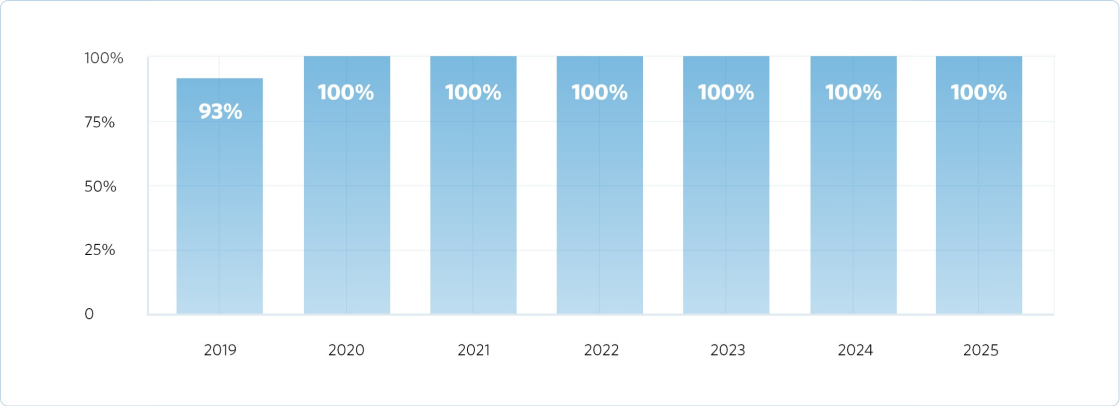
Income Generated from
REITs is Tax Advantaged
Real Estate Investment Trusts (REITs) benefit from two main tax-advantages:

SREIT’s Return of Capital for 2025 is 100%, which means the maximum effective federal tax rate on SREIT’s 2025 distributions is 0%2
SREIT’s Historic Return of Capital

Illustrative
Example3
$100,000 Investment
In the following example, utilizing SREIT’s 5.7% annualized distribution rate (for the I Share as of December 31, 2024) and the 2024 tax year actual ROC of 100%, the tax equivalent yield is 9.7%4
- 680 basis points higher than the US Bond Aggregate Index Yield
- 890 basis points higher than the S&P 500 Index Dividend Yield
| US Bond Aggregate5 | S&P 5006 | SREIT7 | |
| Investment | $100,000 | $100,000 | $100,000 |
| 2024 ROC | - | - | 100% |
|
Current Pre-Tax Yield (As of December 31, 2024) |
4.91% | 1.27% | 5.73% |
| Distributions | $4,910 | $1,270 | $5,733 |
| ROC | - | - | ($5,733) |
| Taxable Basis | $4,910 | $1,270 | - |
| Tax Rate | 40.8% | 40.8% | 33.4% |
| Tax Payable | ($2,003) | ($518) | $0 |
| After Tax Distributions | $2,907 | $752 | $5,773 |
| Effective Federal Tax Rate | 40.8% | 40.8% | - |
| After-Tax Yield | 2.9% | 0.8% | 5.7% |
| Tax Equivalent Yield8 | 2.4% | 0.8% | 9.7% |
Disclosures/Footnotes
Each investor’s tax considerations are different and consulting a tax advisor is recommended. Any of the data provided herein should not be construed as investment, tax, accounting or legal advice. A portion of REIT distributions may be tax deferred given the ability to characterize ordinary income as Return of Capital (“ROC”). ROC distributions reduce the stockholder’s tax basis in the year the dividend is received, and generally defer taxes on that portion until the stockholder’s stock is sold via redemption. Certain non-cash deductions, such as depreciation and amortization, lower the taxable income for REIT distributions. Investors should be aware that a REIT’s ROC percentage may vary significantly in a given year and, as a result, the impact of the tax law and any related advantages may vary significantly from year to year. SREIT’s return of capital was 92% in 2019, 100% in 2020, 100% in 2021, 100% in 2022, 100% in 2023, and 100% in 2024.
- Return of capital reduces the stockholder’s tax basis in the year the distribution is received, and generally defers taxes on that portion until the capital asset is sold. Certain non-cash deductions, such as depreciation and amortization, lower the taxable income for REIT distributions.
- Assumes the maximum ordinary tax bracket of 37% and includes the 3.8% Medicare surtax that is applied to the net investment income above certain thresholds. Please note the effective tax rate is after the 20% reduction in rates introduced under the Tax Cuts and Jobs Act of 2017.
- The illustrative example assumes $100,000 investment and a maximum ordinary tax bracket of 37% and includes the 3.8% Medicare surtax that is applied to the net investment income above certain thresholds. It does not include state taxes. Investors could be subject to state income tax in their state of residence which would lower the after tax yield received by the investor. The illustrative example does not reflect the impact of increasing net operating income (“NOI”); an increasing NOI from higher rents would reduce the amount of ROC. Past performance is not indicative of future results.
- SREIT cannot guarantee that we will make distributions, and if we do we may fund such distributions from sources other than cash flow from operations, including, without limitation, the sale of assets, borrowings, return of capital or offering proceeds, and we have no limits on the amounts we may pay from such sources. Our inception to date cash flows from operating activities funded 100% of our distributions. Distributions are not guaranteed and may be sourced from non-income items.
- Bloomberg Barclays US Bond Aggregate as of December 31, 2024.
- S&P 500 Dividend Yield is as December 31, 2024, as calculated by the dividends per share trailing twelve months (TTM) divided by the close price for the month.
- SREIT Annualized Distribution Rate as of December 31, 2024.
- After-Tax Yield does not take into account other taxes that may be owed on an investment in SREIT when the investor redeems their shares. Upon redemption, the investor may be subject to higher capital gains taxes as a result of a depreciating cost basis due to the return of capital portion of distributions.
An investment in Starwood Real Estate Income Trust, Inc. involves a high degree of risk. You should purchase these securities only if you can afford the complete loss of your investment. You should carefully read the information set forth in the “Risk Factors” section of the prospectus before buying our shares. Terms used and not defined herein have the same meanings set forth in the prospectus. Risks include, but are not limited to:
- We have incurred GAAP net losses attributable to stockholders and an accumulated deficit in the past and may incur GAAP net losses attributable to stockholders and continue to have an accumulated deficit in the future.
- We have held certain of our current investments for only a limited period of time, and investors will not have the opportunity to evaluate our future investments before we make them.
- Since there is no public trading market for shares of our common stock, repurchase of shares by us will likely be the only way to dispose of your shares. Our share repurchase plan provides stockholders with the opportunity to request that we repurchase their shares on a monthly basis, but we are not obligated to repurchase any shares and may choose to repurchase only some, or even none, of the shares that have been requested to be repurchased in any particular month in our discretion. In addition, repurchases are subject to available liquidity and other significant restrictions, including monthly and quarterly repurchase limits. Since October 2022, repurchase requests have consistently exceeded the applicable monthly and/or quarterly limits of our share repurchase plan and may continue to do so in the future. Further, our board of directors may modify or suspend our share repurchase plan if it deems such action to be in our best interest and the best interest of our stockholders. As a result, our shares should be considered as having only limited liquidity and at times may be illiquid.
- We cannot guarantee that we will make distributions, and if we do, we may fund such distributions from sources other than cash flow from operations, including, without limitation, the sale of assets, borrowings or offering proceeds (including from sales of our common stock or Operating Partnership units to the Special Limited Partner), and we have no limits on the amounts we may pay from such sources.
- The purchase and repurchase price for shares of our common stock are generally based on our prior month’s NAV (subject to material changes as described in the prospectus) and are not based on any public trading market. While there are independent annual appraisals of our properties, the appraisal of properties is inherently subjective, and our NAV may not accurately reflect the actual price at which our properties could be liquidated on any given day.
- We are dependent on Starwood Capital and its affiliates, including Starwood REIT Advisors, L.L.C. (the “Advisor”), and their key personnel who provide services to us through the Advisory Agreement, and we may not find a suitable replacement for the Advisor if the Advisory Agreement is terminated, or for these key personnel if they leave Starwood Capital or otherwise become unavailable to us.
- This is a “best efforts” offering. If we are not able to continue to raise a substantial amount of capital on an ongoing basis, our ability to achieve our investment objectives could be adversely affected.
- There are limits on the ownership and transferability of our shares.
- If we fail to qualify as a REIT and no relief provisions apply, our NAV and cash available for distribution to our stockholders could materially decrease.
- The acquisition of properties may be financed in substantial part by debt. The use of leverage involves a high degree of financial risk and will increase the exposure of the investments to adverse economic factors.
- Investing in commercial real estate assets involves certain risks, including, but not limited to: changes in values caused by global, national, regional or local economic, demographic or capital market conditions, including economic impacts resulting from trade conflict, civil unrest, national and international security events, geopolitical events, military conflicts and war, the performance of the real estate sector, unemployment, stock market volatility, adverse economic conditions as a result of an epidemic, pandemic or other health-related issues; demographic or capital market conditions; operational risks such as cyberattacks; increases in interest rates and lack of availability of financing; changes in government rules, regulations and fiscal policies; vacancies, fluctuations in the average occupancy and room rates for hospitality properties; and bankruptcies, financial difficulties or lease defaults by our tenants.
- A change in U.S. tax laws could adversely impact benefits of investing in our shares.
This sales and advertising literature does not constitute an offer to sell nor a solicitation of an offer to buy or sell securities. An offering is made only by the prospectus. This material must be read in conjunction with the Starwood Real Estate Income Trust, Inc. prospectus in order to fully understand all of the implications and risks of the offering of securities to which the prospectus relates. A copy of the prospectus must be made available to you in connection with any offering. No offering is made except by a prospectus filed with the Department of Law of the State of New York. Neither the Securities and Exchange Commission, the Attorney General of the State of New York nor any other state securities regulator has approved or disapproved of these securities or determined if the prospectus is truthful or complete, or determined whether the offering can be sold to any or all purchasers in compliance with existing or future suitability or conduct standards. Any representation to the contrary is a criminal offense.